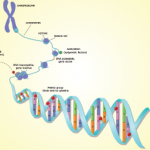A first-of-its-kind study has been published that integrates genotype and epigenotype data across the entire genome. The work was performed in patients with rheumatoid arthritis (RA) and controls. The study provides the first evidence that DNA methylation mediates a disease genotype. In other words, it is the DNA methylation that allows the genotype to be expressed as RA.
The researchers accomplished this feat through analyzing cell-type distributions. They created a new approach to the study of epigenetics that allows for the correction of cell heterogeneity and the filtering out of signals that may be caused by the disease itself. These adjustments allow investigators to distinguish between DNA methylation changes that are truly a marker of causal mechanism and those that are a consequence of disease.
The success of the approach paves the way for similar human epigenetic studies in the future. Yun Liu, PhD, of Johns Hopkins University School of Medicine in Baltimore, and colleagues published their results in Nature Biotechnology.1 They explain in their publication that the approach can be applied to many tissue sources as long as cell-specific methylation signatures are available for the particular cell mixture. The authors acknowledge, however, that the new approach may still include residual confounding between cell types.
In analyzing patients with RA, the authors identified ten CpG sites that represent signals across five genomic regions. They also identified evidence for single-nucleotide polymorphism (SNP) regulation of DNA methylation variation. They propose that one of the genes in these regions should show altered regulation related to DNA methylation and that this novel nonlinear gene–protein relationship will be found to contribute to RA.
Tomas J. Ekstrom, PhD, of the Karolinska Institute in Stockholm, Sweden, was one of the authors of the study. He explained its clinical implications to The Rheumatologist via email: “If we pin down genetic and environmental factors involved in the pathogenic initiation process, clinicians might be able to employ new biomarkers and external influences to find vulnerability to RA. In addition, since we found that DNA methylation may mediate genetic vulnerability and that epigenetic modifications are potentially reversible, maybe the future will hand us therapeutic tools to reverse a pathogenic process, or prevent it from starting.”
The current study was performed using blood samples from patients. Dr. Ekstrom explained that the use of blood cells is convenient and relevant, but that future studies could investigate cells from target tissues such as the synovium. An analysis of these cells might shed light on the mechanisms involved in the actual joint degradation process.


